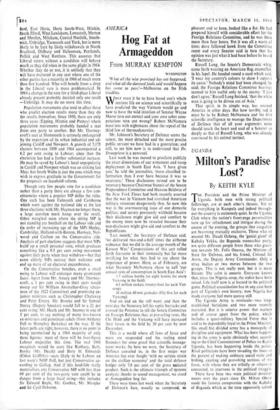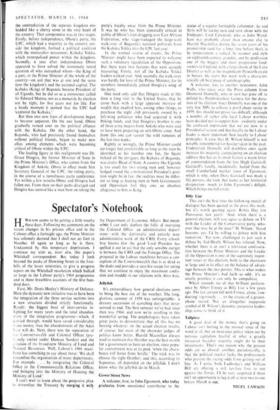UGANDA
Milton's Paradise Lost?
By KEITH KYLE
THE President and the Prime Minister of Uganda, both men with strong political followings, are at each other's throats. Yet so far everything in Kampala and indeed through- out the country is ominously quiet. In the Uganda Club where the nation's front-page personalities turn up for refreshment and intrigue during the course of the evening, the groups that coagulate are becoming mutually exclusive. Those who sit around Mr. Daudi Ocheng, the 'genial giant' of Kabaka Yekka, the Baganda monarchist party, are quite different people from those who gravi- tate towards Mr. Felix Onama, the Minister of State for Defence, and his friend, Colonel ldi Amin, the Deputy Army Commander. Only a stray Indian or two moves between the two groups. This is not really new, but it is more blatant. The calm is uneerie. Everyone knows that, since the Nigeria coup, the stakes have been raised. Life itself now is at hazard in the political game. Political assassination has in any case been part of Uganda's own history; now Nigeria has made everyone feel more queasy still.
The Uganda Army is miniscule—two long- established battalions and two more recently recruited. But it is relative power that matters and of course apart from the police, which includes a quasi-military Special Force that is said to be dependably loyal to the Prime Minister, this small but divided army has a monopoly of discipline and equipment. What has been happen- ing in the army is quite obviously what, accord- ing to the Chief Commissioner of Police on Radio Uganda, has been happening inside the police. Rival politicians have been invading the lines on the pretext of making ordinary social visits and bribing, cajoling and provoking sections of the force, with whom they are tribally or °then\ ice connected, to intervene in the political struggle.
There have been two main political develop- ments over the years since Dr. Milton Obote made his famous compromise with the Kabaka of Buganda which at the time apparently solved the contradiction of the separate kingdom em- bedded like a cherry stone in the very heart of the country. That compromise was in two stages. Firstly, before independence, Obote's party, the UPC, which had a majority in the country out- side the kingdom, formed a political coalition with the monarchist movement, Kabaka Yekka, which monopolised power within the kingdom. Secondly, a year after independence Obote appeared to have solved the immensely vexed question of who outranked whom—the King of a part, or the Prime Minister of the whole of the country—on soil that was at one and the same time the kingdom's and the national capital. The Kabaka (King) of Buganda became President of all Uganda, but he did so as a commoner called Sir Edward Mutesa, not as a monarch, by election not by right, for five years not for life. For a heady moment it seemed that the UPC had 'captured the Kabaka.'
But then two new lines of development began to become apparent. On the one hand, Obote gradually turned sour on the political alliance with the Kabaka. On the other hand, the Baganda, who had previously found themselves without political friends, began to make new allies among elements which were becoming critical of Obote within the UPC.
The leading figure in this realignment was Dr. Grace Ibingira, the former Minister of State in the Prime Minister's Office, who comes from the Kingdom of Ankole. Obote in effect made him Secretary General of the UPC, the ruling party, in the course of a tumultuous party conference. Yet within a few months Obote and Ibingira had fallen out. From then on their paths diverged and Ibingira has seemed like a man bent on taking the party's loyalty away from the Prime Minister. It was he who has been repeatedly critical in public of Obote's foot-dragging over East African Federation, who stage-managed the large-scale walk-over of Buganda's national politicals from the Kabaka Yekka into the UPC last year.
In the normal course of events, the Prime Minister might have been expected to welcome such a voluntary liquidation of the Opposition. But there were two features that were scarcely reassuring. Firstly, not all the Kabaka Yekka leaders walked over. And, secondly. the walk-over was hardly for love of the Prime Minister, for its members immediately joined Ibingira's wing of the party.
One need only add that Ibingira made at this time a long visit to the United States, that he came back with a large apparent increase of wealth that enabled him, among other things, to purchase the night club previously owned by a left-wing politician who had acquired it with Peking funds, and that Ibingira's brother is one of three army majors from Ankole who were said to have been preparing an anti-Obote coup. And from this one can savour the wild rumours of the last two weeks.
Rightly or wrongly, the Prime Minister could no longer feel comfortable so long as the man he identified as his number one foe, the figure behind all the intrigues, the Kabaka of Buganda, was titular Head of State. A country like Uganda is too small for two strong men and, however hedged round the constitutional President's posi- tion might be in law, the realities must be differ- ent so long as leading men in both Government and Opposition feel they owe an absolute allegiance to him as King.







































 Previous page
Previous page